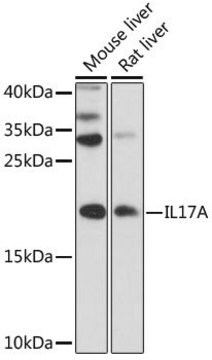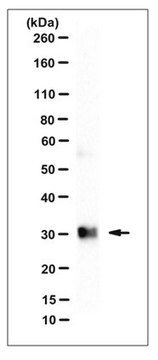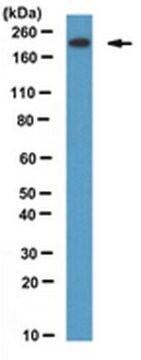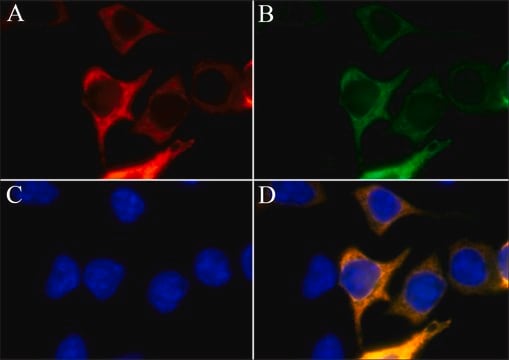MABS274
Anti-LRP6, clone A59, Ectodomain Antibody
clone A59, from mouse
Synonyme(s) :
Low-density lipoprotein receptor-related protein 6, LRP-6
About This Item
Produits recommandés
Source biologique
mouse
Niveau de qualité
Forme d'anticorps
purified immunoglobulin
Type de produit anticorps
primary antibodies
Clone
A59, monoclonal
Espèces réactives
human
Technique(s)
flow cytometry: suitable
immunocytochemistry: suitable
immunoprecipitation (IP): suitable
Isotype
IgG1κ
Numéro d'accès NCBI
Numéro d'accès UniProt
Conditions d'expédition
wet ice
Modification post-traductionnelle de la cible
unmodified
Informations sur le gène
human ... LRP6(4040)
Description générale
Immunogène
Application
Immunoprecipitation Analysis: A representative lot from an independent laboratory immunoprecipitated LRP6, Ectodomain from Wnt3a-treated HEK293T cell lysate (Yasui, N., et al. (2010). J Immunol Methods. 352(1-2):153-160.).
Immunocytochemistry Analysis: A representative lot from an independent laboratory detected LRP6, Ectodomain in HeLa S3 cells (Yasui, N., et al. (2010). J Immunol Methods. 352(1-2):153-160.).
Signaling
Insulin/Energy Signaling
Qualité
Flow Cytometry Analysis: 2 µg of this antibody detected LRP6, Ectodomain in 1X10E6 HEK293 cells.
Description de la cible
Forme physique
Stockage et stabilité
Autres remarques
Clause de non-responsabilité
Vous ne trouvez pas le bon produit ?
Essayez notre Outil de sélection de produits.
Code de la classe de stockage
12 - Non Combustible Liquids
Classe de danger pour l'eau (WGK)
WGK 1
Point d'éclair (°F)
Not applicable
Point d'éclair (°C)
Not applicable
Certificats d'analyse (COA)
Recherchez un Certificats d'analyse (COA) en saisissant le numéro de lot du produit. Les numéros de lot figurent sur l'étiquette du produit après les mots "Lot" ou "Batch".
Déjà en possession de ce produit ?
Retrouvez la documentation relative aux produits que vous avez récemment achetés dans la Bibliothèque de documents.
Notre équipe de scientifiques dispose d'une expérience dans tous les secteurs de la recherche, notamment en sciences de la vie, science des matériaux, synthèse chimique, chromatographie, analyse et dans de nombreux autres domaines..
Contacter notre Service technique








